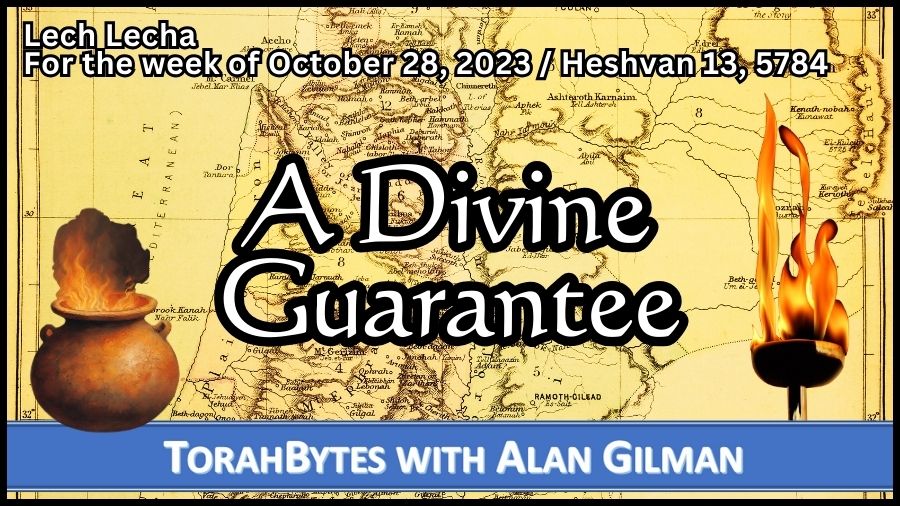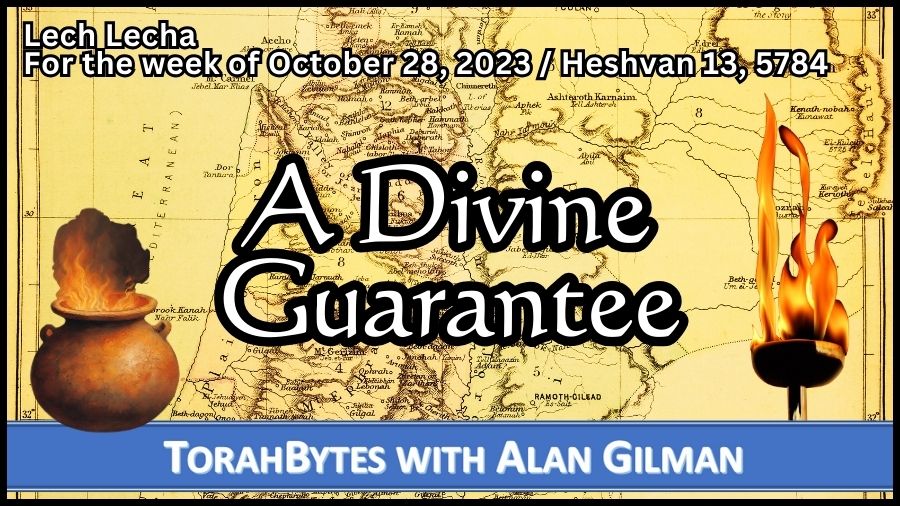
A Divine Guarantee
For the week of October 28, 2023 / 13 Heshvan 5784

Lech Lecha
Torah: Bereshit/Genesis 12:1 – 17:27
Haftarah: Isa 40:27-41:16
On that day the Lord made a covenant with Avram, saying, “To your offspring I give this land…” (Bereshit/Genesis 15:18)
It is no exaggeration to say that we may be on the brink of a catastrophe hitherto unknown in history. I hope I am wrong—that the current crisis in Israel will calm down, but not until the demonic evil unleashed by Hamas on October 7 is destroyed. I have no illusions, however, if by God’s grace that happens, it will manifest again soon and probably worse.
Scriptures taken from the English Standard Version, except that “Abram” is changed to “Avram”
Serious readers of Scripture have no reason to be unaware of the dynamics at play, including why it is that so much fuss is made over one of the smallest countries on the planet. Yet, not only are most people unaware of such things, but they have also reduced the God of the Bible to a detached spirituality of the inner life, while failing to grasp its global implications and all-encompassing importance. Core to this misguided spirituality is the disregard for the centrality of the people of Israel and the land of Israel in God’s plan.
This week’s parsha (weekly Torah-reading portion) is foundational in this regard. It begins with Avram, whose name is later changed to Avraham (you can figure out the English versions of his name yourself, I am sure). The God of all creation, who made everything “very good” (Bereshit/Genesis 1:31), determined to one day rid the universe of the curse he imposed on the earth due to our first parents’ rebellion against him (see Bereshit/Genesis 3:17-19). Described as the bruising or crushing of the serpent’s head (see Bereshit/Genesis 3:15), we are given no detail as to how this plan was to be worked out until this parsha. If Avram would venture to the alien land God would show him, he would make him a great nation and bless the entire world as a result (see Bereshit/Genesis 12:1-3). One of Avram’s most famous descendants would call the promise to bless the nations, the good news or Gospel (see Galatians 3:8).
The agreement, contract, or covenant (they all mean the same, by the way) that God established with Avram included an aspect that Bible readers have tragically ignored. People often called the covenant made with Avram unconditional, but it did have one condition—a condition he fulfilled. He had to go to a specified location. It wasn’t until he arrived there, that God said, “To your offspring I will give this land” (Bereshit/Genesis 12:7). The land, therefore, was a crucial aspect of God’s covenant with Avram, which was later passed on to his son Isaac (see Bereshit/Genesis 26:2-5) and grandson Jacob (see Bereshit/Genesis 28:13-14).
But did you know how essential the land promise to Avram was? As we also read in this week’s parsha, sometime later, God says to him: “Fear not, Avram, I am your shield; your reward shall be very great” (Bereshit/Genesis 15:1). Avram’s trusting response to God’s telling him that, despite his ongoing childlessness, his descendants will be like the stars of the sky, is an appropriate high point for many Bible believers as it demonstrates the importance of faith.
Following that interchange, God has Avram perform a covenant ritual whereby he was to cut up some animals (see Bereshit/Genesis 15:7-20). Apparently, this was a traditional covenant-making ceremony. The Hebrew for “make a covenant” is actually “cut a covenant,” probably taken from the cutting up of the animals. The two parties would walk together between the pieces as a way to declare that if either fails to live up to their covenantal obligations, may they become like the cutup pieces. But note that Avram doesn’t walk between the pieces. Instead, he sees the unusual site of a smoking firepot and a flaming torch passing through them. Commentators consider this an indication that God was taking the full covenantal obligation on himself, so that if either party would break covenant, he, that is God, would suffer the consequences. We see this happen in the person of the Messiah, of course. But neglecting the context of all this prevents us from seeing an essential aspect of God’s commitment to the people of Israel. God’s self-imposed covenantal obligations to the people is not only about the people. Here’s what God says when he reiterates the covenant to Avram:
“To your offspring I give this land, from the river of Egypt to the great river, the river Euphrates, the land of the Kenites, the Kenizzites, the Kadmonites, the Hittites, the Perizzites, the Rephaim, the Amorites, the Canaanites, the Girgashites and the Jebusites (Bereshit/Genesis 15:18-21).
God’s covenant with Avram includes the land, guaranteed! Should Avram or his descendants (those through Isaac and Jacob) fail in their covenantal obligations, God himself would bear the punishment. You know what this means, don’t you? Yeshua’s death doesn’t only ensure your reconciliation with God by faith, but also upholds Israel’s divine right to their God-given land.